Address any questions or comments regarding this newsletter to the individual authors listed after each article or to its editors, Nathan Johanning, 618-939-3434, njohann@illinois.edu or Bronwyn Aly 618-695-6060, baly@illinois.edu. The Illinois Fruit and Vegetable News is available on the web at: http://ipm.illinois.edu/ifvn/. To receive or be removed from email notification of new postings of this newsletter, contact Nathan Johanning or Bronwyn Aly at the phone numbers or email addresses above.
In This Issue:
Upcoming programs (listings for beginning and established growers)
News & Announcements (2021 Summer Hort Field Day, New IPM Videos released in Spanish)
Regional Reports (St. Louis metro east, southwestern Illinois (Waterloo), southern Illinois (Murphysboro), Dixon Springs)
Fruit & Vegetable Production & Pest Management (Weather & Climate Summary: A Wild February Ended an Otherwise Mild Winter)
Upcoming programs
See the University of Illinois Extension Local Food Systems and Small Farms Team’s website at:
http://web.extension.illinois.edu/smallfarm/ and the calendar of events at http://web.extension.illinois.edu/units/calendar.cfm?UnitID=629.
- Backyard Greenhouse Basics, April 7, 2021, 1:30pm, Virtual program. Join Extension Educator Katie Bell as she explains the benefits of having a backyard greenhouse, and tips to get your greenhouse ready for the planting season. Master Gardener will lead a short seed starting activity following the presentation. To register visit https://web.extension.illinois.edu/registration/?RegistrationID=23154. For more information please contact Christiana Lueking at lueking@illinois.edu, (618-548-1446) or Katie Bell at klbell@illinois.edu, (618-687-1727)
- 2021 Summer Horticulture Field Day, Thursday, June 10, 2021, in person at Edwards Apple Orchard West, Winnebago, IL. Save the date and make plans to attend the annual Summer Hort Field Day sponsored by Illinois State Horticulture Sociey, Illinois Specialty Growers Association, and University of Illinois Extension! For more information or to register online visit https://www.specialtygrowers.org/summer-horticulture
- 2021 Southern Illinois Summer Twilight Meeting Series, monthly evening meetings May-August at 6 p.m. After a year off, plans are underway to host IN-PERSON twilight meetings across southern Illinois during the 2021 growing season. For more information visit https://extension.illinois.edu/news-releases/2021-southern-illinois-summer-twilight-series or to register online directly, visit go.illinois.edu/2021TwilightSeries
- May 17, 2021 Flamm Orchards, Cobden, IL – plasticulture strawberry production
- June 21, 2021 Dixon Springs Agricultural Center, Simpson, IL – high tunnel insect management & vegetable production
- July 12, 2021 Baebler Educational Farm, Waterloo, IL – no-till tomato & pepper production
- August 16, 2021 Bauman Family Farm, Vienna, IL – regenerative grazing in cattle production
News & Announcements
ILLINOIS STATE HORTICULTURAL SOCIETY PRESENTS
2021 Summer Horticulture Field Day
Thursday June 10, 2021 at Edwards Apple Orchard West, Winnebago, Illinois
Pre-Registration is $30 per person, or $40 at the door (includes lunch). Children under 12 are welcome free of charge!
Please register before June 1st!
REGISTER & PAY ONLINE AT WWW.TICKETTAILOR.COM/EVENTS/ISHS
2021 HORT DAY FLYER & TENTATIVE AGENDA
Note from ISHS Vice President
Summer Horticulture Day is my favorite of our meetings as a member of the Illinois Specialty Growers Association. I love taking a break from our summer work to visit another growers farm. There is always something to learn from this experience, even if it is something small, like a new trick for planting pumpkins, different signage to use on the farm, or a new way to package and sell produce, and usually some bigger things as well, such as how to manage Phytophthora in apples from Dr. Mohammad Babadoost. Summer Horticulture Day is also a great time to reconnect with old friends and industry supporters. I have made some of my very closest friends through this field day, and always try to meet new people as well.
Sincerely,
Jenna Spychal
Illinois State Horticulture Society (ISHS)
Summer Horticulture Field Day Coordinator
After a year of many challenges and online meetings for our industry, the Illinois State Horticultural Society is proud to announce the return of our in-person Summer Horticulture Field Day at Edwards Apple Orchard West in Winnebago, Illinois.
The Edwards Family is proud to invite guests to tour their orchard and farm market operation on Thursday, June 10th for the annual event. The orchard has been open for over 30 years and features 18 different varieties of apples from over 8500 trees, freshly made apple cider, and their famous apple cider donuts. They also have pick-your-own pumpkins & raspberries, and grow autumn mums for fall displays. Activities include wagon rides, a children’s play area, and petting farm with a goat walk. Their farm market and bakery are located inside a beautifully renovated dairy barn built in 1893 providing the perfect backdrop for their unique seasonal gift items, food products, fresh apples, cider & donuts. Not only will this be a wonderful time to learn about the Edwards Family’s operation and experiences, but guests will also be able to speak with industry vendors, learn about new equipment and products, and speak with other growers from all over the state. There will also be specialty crop experts from the University of Illinois & Extension available on our field tour to discuss specialty crops, disease & pest management, and more on apples, pumpkins, raspberries, and mums.
Join us for field & orchard tours with Ag Specialists from the U of I and Extension discussing current management practices of apples, pumpkins, and raspberries. We will also discuss high-density orchard management, using drones on your farm, transitioning to the next generation, and more. Lunch will feature networking opportunities with growers and relevant industry businesses, as well as discussions on-farm marketing.
Farm & Field Tours
- Pruning & Training High-Density Apples
- Troubleshooting your Bakery & Farm Market during busy season
- Using drones for Marketing
- In Field Discussions with University &Extension Specialists on Apples, Pumpkins, Raspberries, & Mums
- Plus more!
Directions: Edwards Apple Orchard West is located about 9 miles Northwest of Rockford off Meridian Rd, on Cemetary. Address: 8218 Cemetary Road Winnebago, Illinois 61088
Lodging Options: Riverview Inn & Suites - 700 W. Riverside Blvd., Rockford, IL (815) 282-3033 Located about 9.0mi or 14min from Orchard Embassy Suites -416 South Main Street., Rockford, IL (815) 668-7878 Located about 10.2 mi or 17 min from Orchard
For details & general information on the program or the event, contact: Jenna Spychal - ISHS Field Day Coordinator (217) 254-5258, jenna@jonamacorchard.com.
New IPM Videos released in Spanish
We just wanted to share a new series of IPM videos release in Spanish from one of our colleagues, Natalie Hoidal, Extension Educator in Local Foods and Vegetable Crops from University of Minnesota Extension.
- Búsqueda de problemas en el campo (Scouting for problems in the field)
- Diagnóstico de problemas de las plantas (Diagnosing plant problems)
- Recolección de plantas enteras para el diagnóstico de problemas de plantas (Collecting plant samples for diagnosis)
Regional Reports
St. Louis metro east…Most of the region experienced a hard frost/freeze at ground level on the morning of April 21, so protection of strawberries was definitely warranted. Air temperatures for the most part ranged from 28°F - 31°F, which would suggest an air inversion with more air mixing higher up. On the morning of April 22, frost accumulated on surfaces higher up, again with temperature hovering just below to slightly above freezing. At this time, growers contacted are still optimistic for a fruit crop. It was near 80 degrees and sunny in the St Louis Metro east on April 19. The last freeze event occurred the mornings of March 31 and April 1 just as peaches were in various stages of bloom, from closed bud in Calhoun County to full bloom in some varieties further south. After inspecting the apple and peach crop for bud damage, growers were optimistic and still expecting a full crop following the early April freeze. Apples are currently at full bloom to petal fall and peaches aren’t quite to shuck split. Grape leaves are unfolded. Strawberries are in various stages depending on type and production system…anywhere from early bloom to berries sizing.
We are looking for Apple and Peach growers who have maintained bloom records for the past 25 years or longer, and would be willing to share that data with the Illinois State Climatologist Trent Ford. He is interested in taking bloom data to see how it correlates to changes in our overall climate. Contact Elizabeth Wahle at wahle@illinois.edu or 217-300-9541 if you would be willing to participate.
If you missed Penn State’s recent 2-hour webinar on Asparagus Production, Management, and Marketing with Carl Cantaluppi, it is available free online at https://extension.psu.edu/asparagus-production-management-and-marketing. Carl is a retired North Carolina State Extension Agent and an expert on commercial asparagus production. In this webinar, Carl discusses variety selection, pre-plant soil preparation, best management practices, pest management, harvest techniques, and postharvest handling.
Still available. If you need a bound copy of the Midwest Vegetable Production Guide for Commercial Growers 2021 or the 2021-22 Midwest Fruit Pest Management Guide, both may be ordered online through Elizabeth Wahle’s office at https://go.illinois.edu/Order2021SprayGuide. We are shipping as orders come in. Both guides are available online as well. The Midwest Vegetable Production Guide for Commercial Growers 2021 is available online at https://mwveguide.org/guide (pdf) or https://mwveguide.org/ (online tool). The 2021-22 Midwest Fruit Pest Management Guide is available online at https://ag.purdue.edu/hla/Hort/Documents/ID-465.pdf.
Elizabeth Wahle (618-344-4230; wahle@illinois.edu)
From southwestern Illinois (Waterloo)… Its been a little cooler than normal in southwestern Illinois. We have mainly been in the 50s and 60s for highs lately but did get up into the 70s earlier this week, just to turn around drop back down below freezing the last few days. We also had maybe an inch or two of snow on Tuesday (4/20), at first is was melting as it came down so it was hard to say exactly how much, but as it got colder some did stay overnight. It amounted to about 0.25” of liquid precipitation. We had 0.1” of rain over the weekend, but other than that things have been reasonable dry. Any tillage and planting has really only slowed for about a day here and there after some precipication. Like everyone else we had two very cold mornings. I saw 30° on 4/21 and 32° on 4/22 for a morning low temperatures. 4/21 there was widespread frost or frozen preciptation on plants, 4/22 the frost was more patchy and more so in lower areas. We did have lots of sun both days which did warm things up even to about 60° on 4/22. About 10 a.m. on the 22nd I measures the soil temperatures at at about 2” and it was 50°.
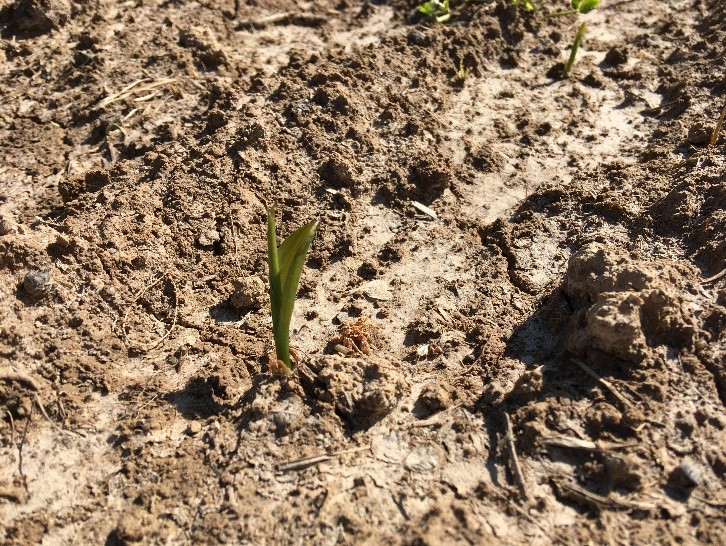
Early planted sweet corn froze at ground level from the recent cold. Photo: N. Johanning
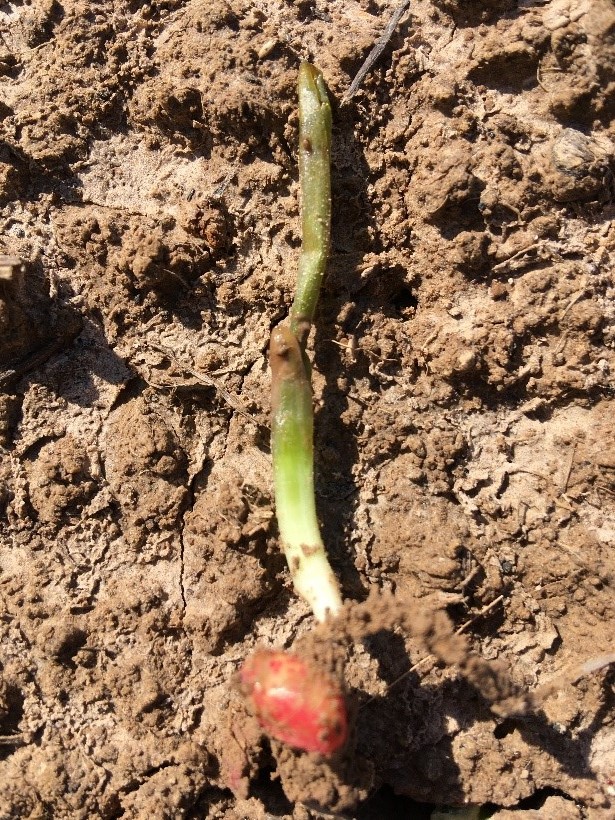
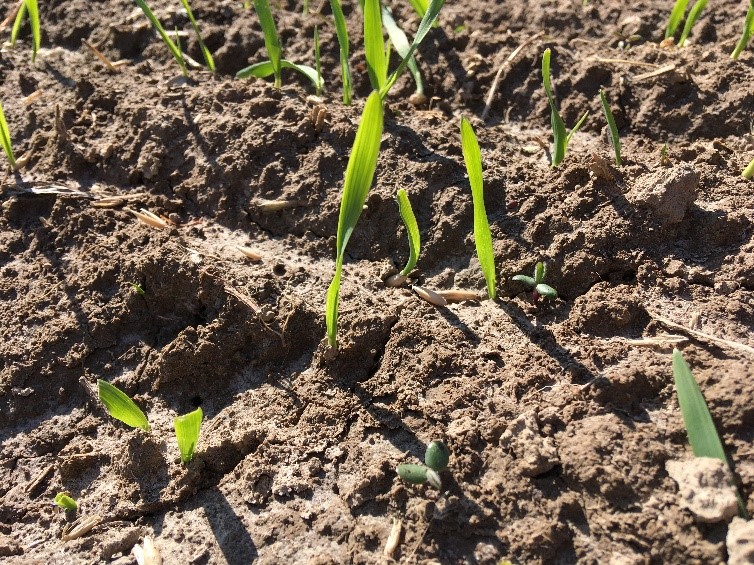
Oats and berseem clover planted for a fallow-year cover crop. Photo: N. Johanning
Apples are towards the late part of bloom, Early and mid-season blueberries are in bloom, and tart cherries are just about done blooming. For any of the these fruit crops I did not see any significant damage as of now but time will tell. I did note a few cherries and apples that did look like they were froze, but at this time it was fairly scattered and only a few. Most tender warm season vegetables would have needed some kind of protection to make it. We had some sweet corn planted 4/6 that was up about at inch tall and it got froze to ground level. The growing point below ground still looked to be in good shape and I think it should rebound without much problems. In talking with a grower today, I was reminded that with a freeze like that sometimes the crop mature of sweet corn can be a little more variable as some plants will rebound a little faster than others which can make a difference in harvest for a crop like sweet corn. I have some potatoes planted that same day which are still mainly all below ground with exception of a few here and there. Fall planted cover crops are gradually taking off. Also on 4/6, I planted some oats and berseem clover as a season long cover ahead of potatoes in 2022. It is taking off well.
Lets hope maybe our frosty mornings are behind us for a while, or at least the snow!
Nathan Johanning (618-939-3434; njohann@illinois.edu)
From southern Illinois (Murphysboro)… Here at the Murphysboro office we have harvested the asparagus patch 6 times, starting on April 9. On April 20, southern Illinois received a light dusting of snow and temperatures in the upper 20’s. All the tender plants were covered and survived the dip in temperature. Asparagus harvested the following day showed signs of frost damage. Many of the emerged spears appeared water soaked, shriveled, and mushy. While the cold temperatures damaged the spears that had already emerged, the spears underground and the crown should be undamaged by the drop in temperatures. All the damaged spears above ground were removed from
the field and composted.
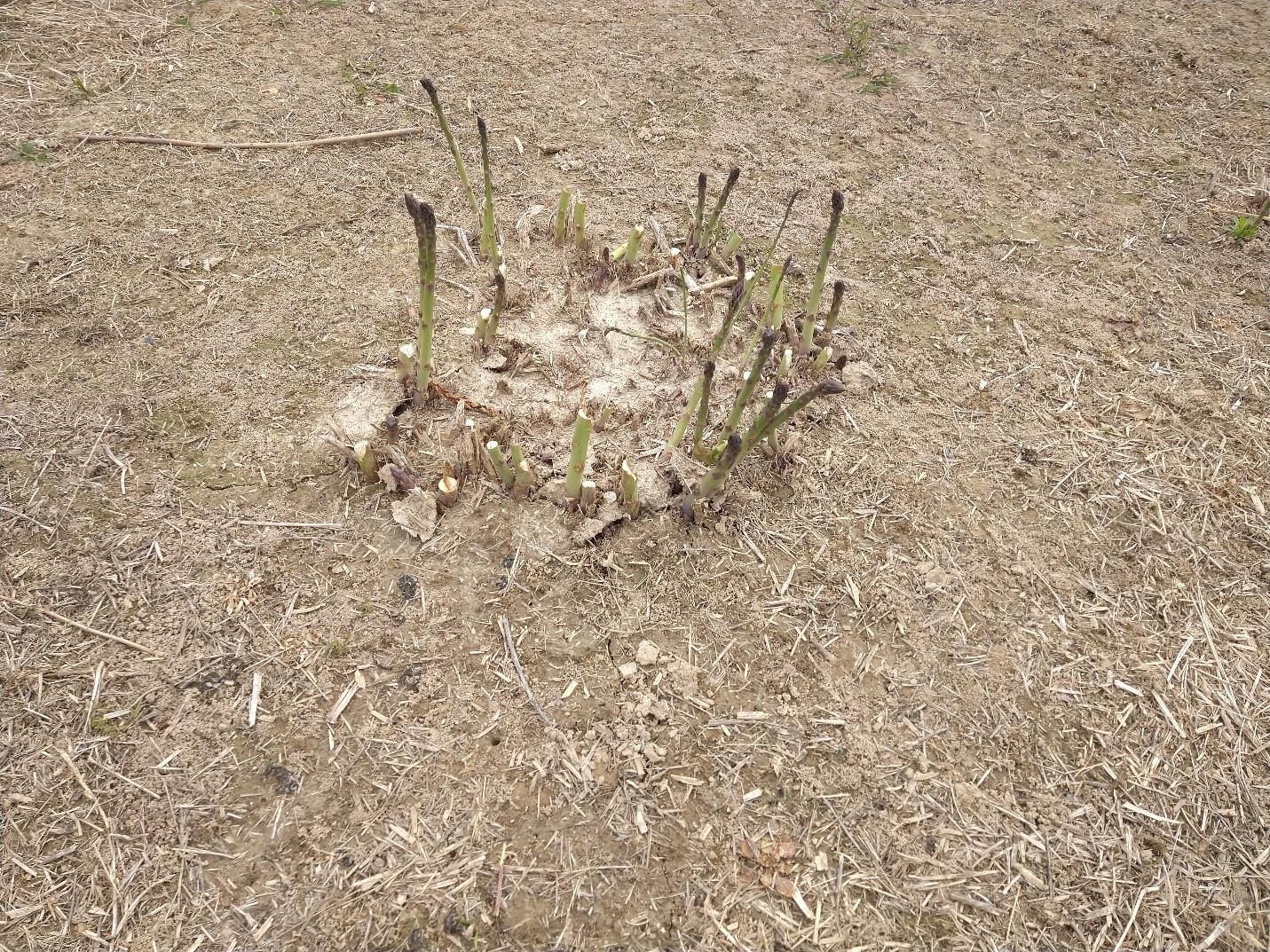
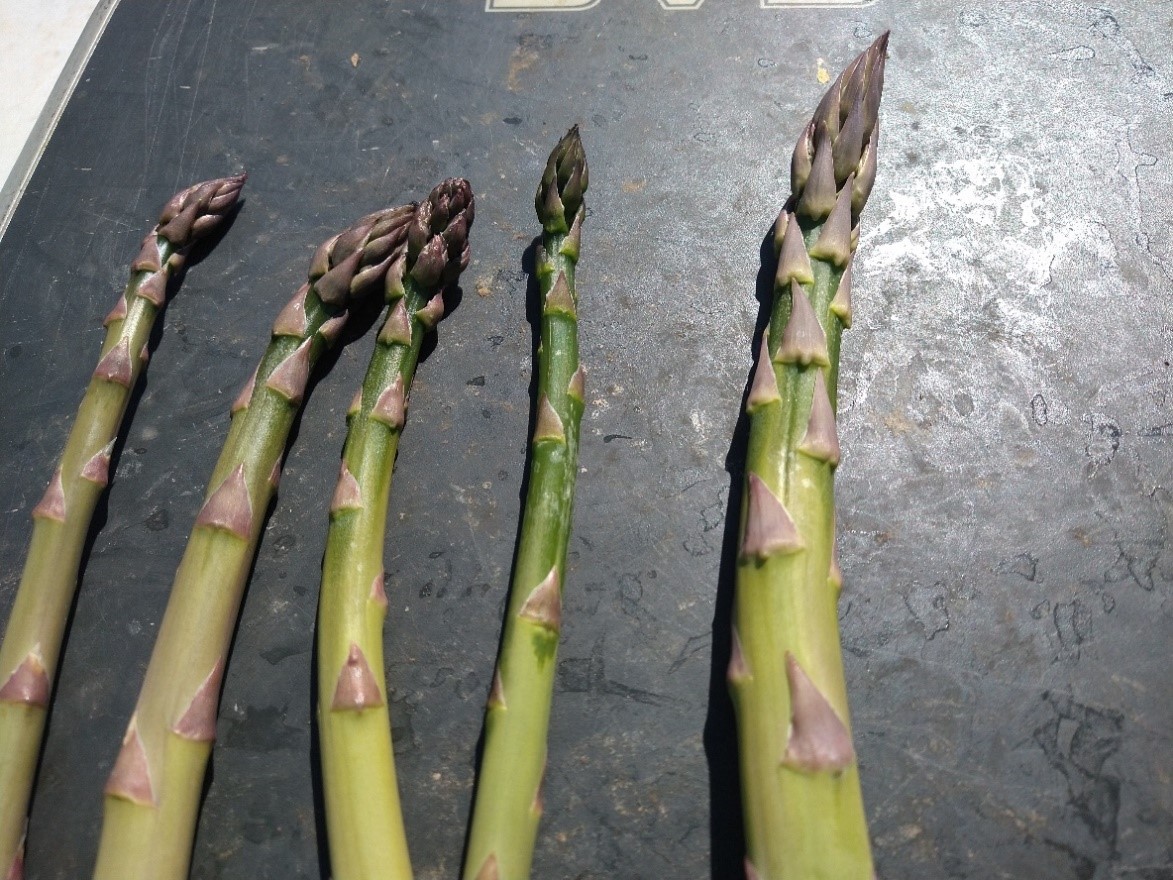
Left: Emerged asparagus spears before April 19-20 frost/freeze event in Murphsyboro, IL at Jackson County Extension office. Right: Emerged asparagus spears appeared water soaked, shriveled and mushy due to damage occurring from the frost/freeze event. Photos by K. Bell.
The high tunnel has been planted with several varieties of heirloom tomatoes, including ‘Marbonne’, ‘Marnouar’, ‘Caspian Pink’, and ‘Red Brandywine’. We have also seeded cucumbers, squash, and melons that will be planted in several community gardens.
We are also currently in the process of finalizing our plot plans for the tomato fertigation trial, and the green bean variety trial. This year the fertigation trial will not be on black plastic, but instead will be no tilled. The green bean variety trial will feature 10 different bush bean varieties planted on second year black plastic beds.
I am excited for spring planting to get started, and I hope everyone has a great growing season!
Katie Bell (618-687-1727; klbell@illinois.edu)
From Dixon Springs Ag Center…We have now had two major cold events in the month of April to overcome as far as vegetable plantings in the high tunnels at DSAC (as I believe everyone else in the region and beyond have experienced as well). The first event was over two evenings, March 31 & April 1, with the first night reaching a low of 31 degrees and the second night dropping even lower to 24 degrees. At this time, we had a few early planted determinate tomatoes already set out in one of the high tunnels and decided to leave 4 of the 12 plants uncovered those two evenings. The remainder of the plants were covered with row cover both nights. The first night did not damage the uncovered tomatoes but the second night, with the temperature in the mid to lower 20s, caused damage to the exposed plants. While high tunnels do offer some degree of protection from cold nights, frost intolerant crop families, like solanaceous and cucurbit, can have injury without the addition of row covers, especially when temperatures are going to reach the mid-20s or lower. Row covers were not applied to any of the crops during the cold event this week as the overnight temperatures were not predicted to go below 30 degrees for our area. Also, tomato stakes had already been driven in place for tying tomatoes and our row covers on hand would not work with the stakes. High tunnel curtains and end walls were buttoned up tight to retain as much radiant heat as possible and block wind from blowing into the tunnels. Thankfully, temperatures stayed within the predicted range and no damage was done to the plants.
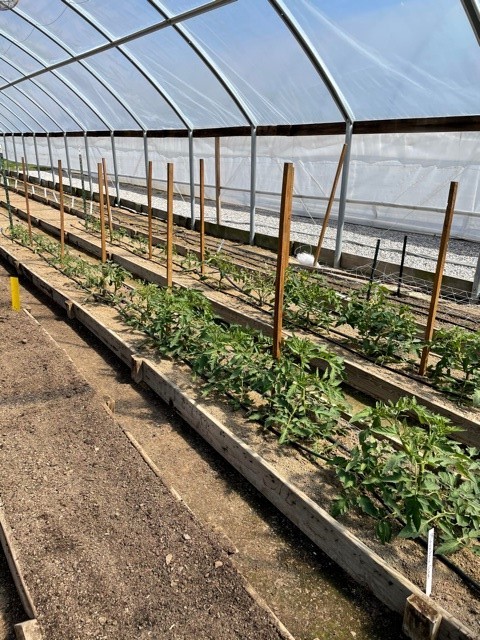
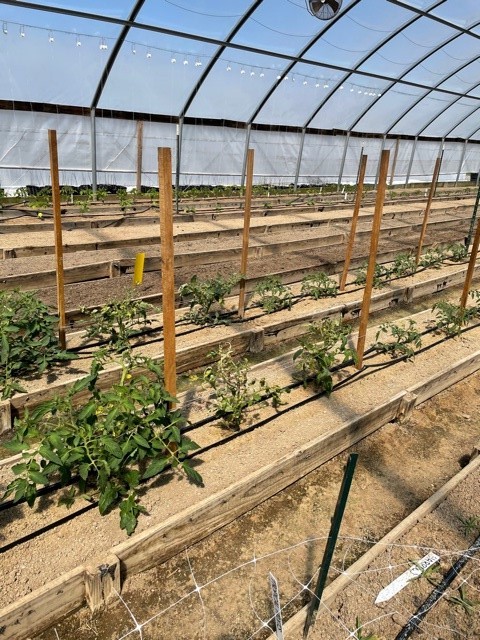
Left: Planting date comparison on determinate tomatoes in the high tunnel at DSAC. Right: Tomatoes planted March 15, 2021 in high tunnel at DSAC. Tomato on the right was NOT covered with row cover and received injury during April 1 cold event while tomato on the left was covered. Photos by B. Aly.
These early planted determinate tomatoes are part of a small observational trial we are conducting to look for any yield differences seen from planting date. We are comparing ‘Mountain Gem’ and ‘Red Mountain’ varieties with plant dates of March 15, April 1, April 15, May 1 & May 15.
Another tomato trial we will be conducting this season will be looking at tomato fertility and the timing of potassium applications. For this replicated trial, we will be comparing yield and fruit quality of three different varieties, ‘Mountain Gem’, ‘Red Mountain’, and ‘Primo Red’ as they each receive the different potassium applications over the course of the growing season. Tomatoes require quite a bit of potassium throughout the growing season to allow for fruit to fully ripen and not suffer from the hard white core or possibly yellow shoulder disorder. How quickly after transplanting do you begin the potassium applications is the question this trial hopes to help answer.
Yellow sticky traps have been placed in all of the high tunnels at DSAC as a way to monitor and identify what insects are inhabiting each of the tunnels. Traps are collected and replaced weekly. This is part of the insect project that Dr. Kacie Athey is conducting at both DSAC and at the student farm on the main campus in Champaign. It has been interesting to see the various types of insects that have been stuck to the traps over the last three weeks, both crop pests and beneficials. Part of this study will be the release and evaluation of natural enemies as a viable biological control strategy for controlling insect pests (thrips, see picture below, are a common insect pest in high tunnels) within a high tunnel production system, and Dr. Athey will be onsite to demonstrate this technique during the June 21 Southern Illinois Summer Twilight Series meeting that will be held at DSAC.
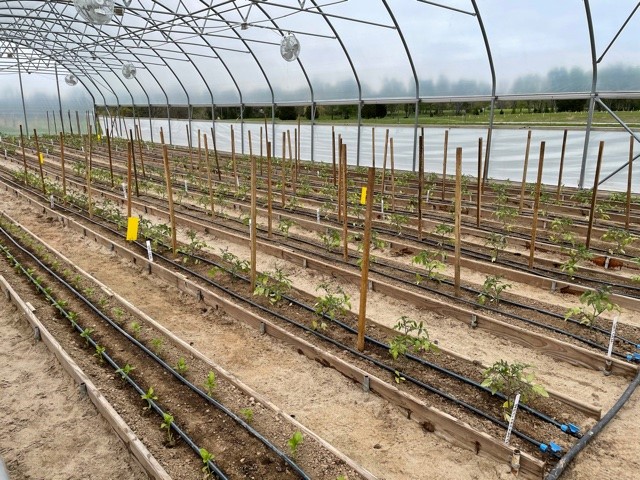
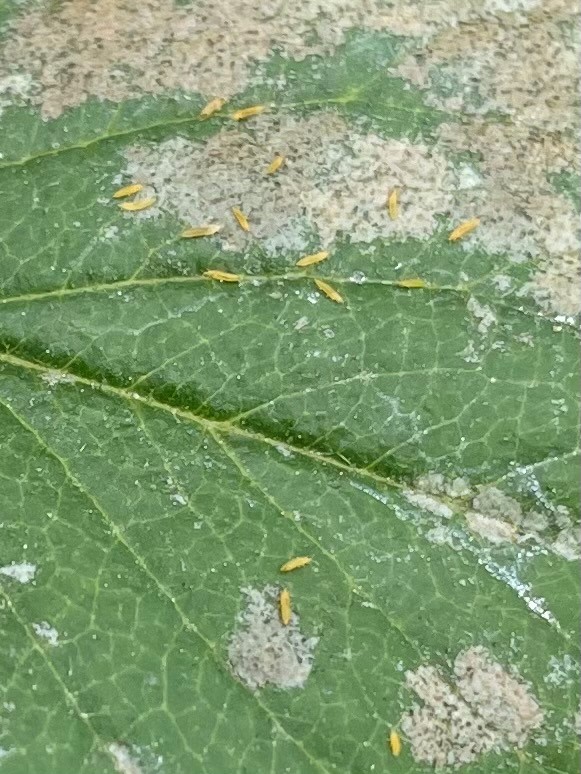
Left:High tunnel at DSAC in which a tomato fertility trial will be conducted along with an insect project to evaluate natural enemy release as a biological control option for insect pests. Right: Heavy thrip pressure on strawberries being grown hydroponically at DSAC. Photos by B. Aly.
Within the hydroponic tunnel, the strawberries have started to ripen and we picked the first quart of berries this week. Thrips pressure is already very high on these plants, which can be seen in the picture above. Several indeterminate tomato and bell pepper varieties were transplanted into the hydroponic tunnel this week as well. Cucumber transplants will be ready to set out either the end of this week or the beginning of next week. Three of the four raspberry varieties overwintered well in the hydroponic tunnel. ‘Joan J’, ‘Niwot’, and ‘Double Gold’ all survived the winter but ‘Bristol’ did not fair as well, as only one of the three plants is still alive. New primocanes are growing well and there is a good bloom set on the floricanes that overwintered. Pruning was completed this week, removing any dead wood on the lateral branches, a few dead canes, and thinning out new primocanes to keep a total of 8 new canes per bucket. I am looking forward to harvesting raspberries much sooner this year than last.
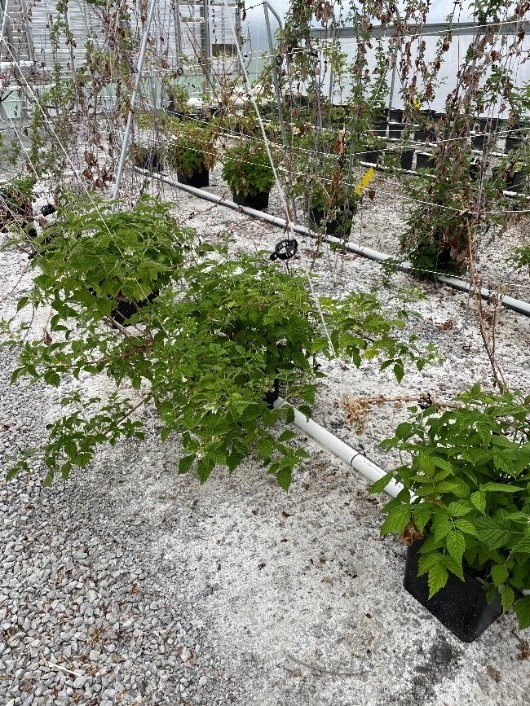
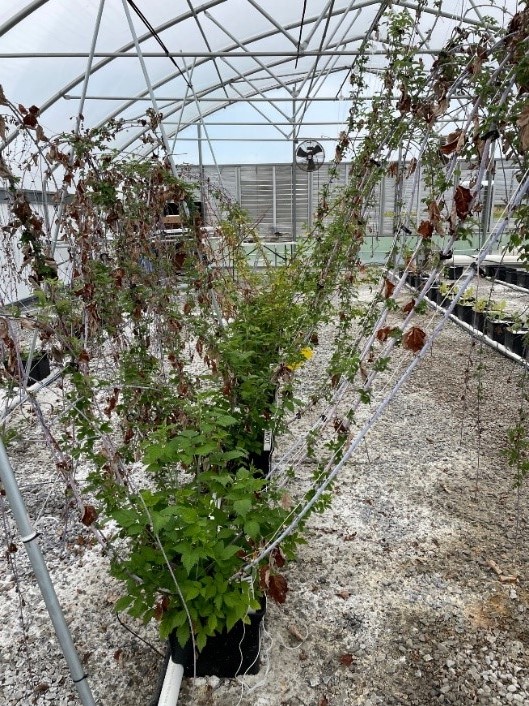
Left: ‘Joan J’ thornless red raspberry grown hydroponically at DSAC. Blooms observed on floricanes that overwintered as well as on new primocanes. Right: ‘Niwot’ black raspberry with blooms just starting to open on overwintered floricanes. New primocanes are growing well from the crown of these plants. Photos by B. Aly.
Bronwyn Aly (618-382-2662; baly@illinois.edu)
Less Seriously

I have been thinking its time to change up the less seriously section of the newsletter. While there are tons of motivational and humorous quotes and jokes floating around (and we have used many of them over the past couple of decades or more), maybe it’s time we shared some of the lighthearted moments we have personally captured over the past year. For the rest of the 2021 IFVN issues, I would like to feature some original photos with captions, memes if you will, from you, our newsletter subscribers. Remember to keep it clean and family friendly. Just email me baly@illinois.edu a photo with a caption (optional) and I’ll try to put in as many as possible.
As an example, I will share a couple of mine that hopefully give you a smile.
Top picture: “Too cool for school!” Our springerdoodle Kacy was way more excited than the kids about school switching to remote learning last year.

Bottom picture: In case you hadn’t noticed from some of the jokes over the past few years, my family, well actually probably more me, is quite found of all things Star Wars. I took this picture of my son in a Princess Leia wig and his expression just makes me laugh. With the timing of this issue and the next, I thought this would be a great way to share my May the 4th Be With You wish to everyone.
University of Illinois Extension Specialists in Fruit and Vegetable Production & Pest Management
Extension Educators – Local Food Systems and Small Farms |
||
Bronwyn Aly, Gallatin, Hamilton, Hardin, Pope, Saline, and White counties |
618-382-2662 |
|
Katie Bell, Franklin, Jackson, Perry, Randolph, & Williamson counties |
618-687-1727 |
|
Sarah Farley, Lake & McHenry counties |
847-223-8627 |
|
Nick Frillman, Woodford, Livingston, & McLean counties |
309-663-8306 |
|
Laurie George, Bond, Clinton, Jefferson, Marion, & Washington counties |
618-548-1446 |
|
Zachary Grant, Cook County | 708-679-6889 | |
Doug Gucker, DeWitt, Macon, and Piatt counties |
217-877-6042 |
|
Erin Harper, Champaign, Ford, Iroquois, and Vermillion counties |
217-333-7672 |
|
Grace Margherio, Jackie Joyner-Kersee Center, St. Clair County |
217-244-3547 |
|
Grant McCarty, Jo Daviess, Stephenson, and Winnebago counties |
815-235-4125 |
|
Katie Parker, Adams, Brown, Hancock, Pike and Schuyler counties |
217-223-8380 |
|
Kathryn Pereira, Cook County |
773-233-2900 |
|
James Theuri, Grundy, Kankakee, and Will counties |
815-933-8337 |
|
Extension Educators – Horticulture |
||
Chris Enroth, Henderson, Knox, McDonough, and Warren counties |
309-837-3939 |
|
Richard Hentschel, DuPage, Kane, and Kendall counties |
630-584-6166 |
|
Andrew Holsinger, Christian, Jersey, Macoupin, & Montgomery counties |
217-532-3941 |
|
Extension Educators - Commercial Agriculture |
||
Elizabeth Wahle, Fruit & Vegetable Production |
618-344-4230 |
|
Nathan Johanning, Madison, Monroe & St. Clair counties |
618-939-3434 |
|
Campus-based Extension Specialists |
||
Kacie Athey, Entomology |
217-244-9916 |
|
Mohammad Babadoost, Plant Pathology |
217-333-1523 |
|